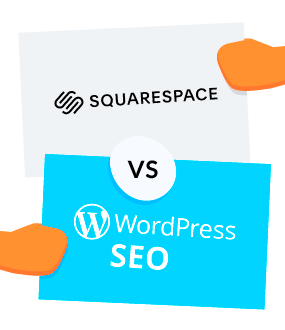When it comes to building a website, two platforms frequently stand out in discussions: Squarespace and WordPress. Both offer distinct advantages and designs, making them popular choices for bloggers, businesses, and e-commerce sites alike. But the big question is, how do they measure up when it comes to SEO? In this article, we’ll explore the key features of Squarespace and WordPress, helping you determine which platform might be the best fit for your needs.
Understanding SEO Basics

Before diving into the specifics of Squarespace and WordPress, it’s essential to grasp some SEO basics. SEO, or Search Engine Optimization, is the art and science of enhancing your website’s visibility in search engine results. When people search for information relevant to your site, you want to be sure they find YOU, right? Here are a few fundamental components of SEO:
- Keyword Research: Understanding what terms your target audience is searching for is crucial. Tools like Google Keyword Planner can help you identify high-traffic keywords.
- On-Page SEO: This includes optimizing individual web pages to rank higher, focusing on elements like titles, meta descriptions, headings, and keyword placement.
- Off-Page SEO: This encompasses external factors that influence your site’s credibility, like backlinks from reputable sources.
- Technical SEO: This involves improving the backend of your website, ensuring it is crawlable and indexable by search engines. Elements include site speed, mobile-friendliness, and structured data.
Remember, effective SEO is not just about implementing tricks; it’s about creating valuable content that resonates with your audience and meets their needs. By understanding these basics, you’ll be better equipped to evaluate how Squarespace and WordPress can help you achieve your SEO goals.
SEO Features of Squarespace

When it comes to building a website, Squarespace offers a range of SEO features that cater to both beginners and those with a bit more experience. While it may not have the extensive customization options of WordPress, Squarespace provides a user-friendly approach that ensures your site is well-optimized for search engines.
One of the standout features is the automatic generation of clean URLs. This means that the URLs for your pages are straightforward and easy for search engines to crawl. Additionally, Squarespace allows you to customize meta titles and descriptions for each page, which is essential for improving click-through rates from search engine results.
Here are some of the key SEO features of Squarespace:
- Built-in SSL: Security is crucial for SEO, and Squarespace automatically provides SSL certificates, ensuring that your website is secure.
- Responsive Design: All Squarespace templates are mobile-responsive, which is a must-have since Google prioritizes mobile-friendly sites in its rankings.
- Image Optimization: Squarespace automatically applies aspects like alt text to images, enhancing their discoverability on search engines.
- Easy Sitemap Generation: Squarespace creates a sitemap automatically, making it easier for search engines to index your content.
Overall, Squarespace is a great option for those looking for a straightforward way to optimize their website for SEO without getting bogged down with technical intricacies.
SEO Features of WordPress

WordPress is the reigning champion when it comes to SEO flexibility and features. Its capabilities make it a popular choice among seasoned SEO professionals and beginners alike. One of the reasons it stands out is the plethora of plugins available, such as Yoast SEO or All in One SEO Pack, which provide advanced features that can help elevate your website’s visibility on search engines.
With WordPress, you have granular control over every aspect of your site’s SEO. You can easily edit your permalink structure, customize meta tags, and optimize your content for specific keywords. Here are some significant SEO features offered by WordPress:
- Custom SEO Plugins: Tools like Yoast SEO provide real-time analysis and suggestions for improving your SEO on each post and page.
- Advanced Customization Options: You can customize your headers, footers, and other areas through coding if you have the technical know-how.
- Easy Integration with Analytics: WordPress makes it simple to integrate Google Analytics and other tracking software to monitor your SEO performance.
- Fast Loading Times: With the right hosting and optimization techniques, WordPress can achieve quicker loading times, which are crucial for SEO.
- Community Support: With a vast community of users and developers, you can easily find tutorials and support to solve any SEO-related issues.
In summary, WordPress is rich in SEO features and customization options, making it an ideal choice for those who want to take a more hands-on approach to their website’s search engine optimization.
Comparing On-Page SEO Capabilities
When it comes to on-page SEO, both Squarespace and WordPress have unique features that can enhance your website’s visibility on search engines. Let’s take a closer look!
Squarespace offers a streamlined approach to on-page SEO. Here are a few of its key features:
- Built-in SEO tools: Squarespace provides basic SEO settings like adding titles, meta descriptions, and alt text for images, all within its user-friendly interface.
- Clean URLs: The platform automatically generates clean URLs that are search-engine friendly, which is a big plus for SEO.
- Mobile responsiveness: Every Squarespace template is mobile-optimized by default, which is essential since Google prioritizes mobile-friendly sites in rankings.
However, while Squarespace simplifies the process with its all-in-one approach, it lacks some advanced features. For example, there isn’t much flexibility for implementing complex SEO strategies.
On the flip side, WordPress reigns supreme with its extensive customization capabilities. Here’s what makes it a powerhouse for on-page SEO:
- Plugins: Plugins like Yoast SEO and All in One SEO Pack allow for intricate optimizations such as schema markup and keyword analysis.
- Custom URLs: You have full control over your permalinks, enabling you to optimize every URL for better rankings.
- Themes: With thousands of themes available, you can choose one that’s optimized for speed, which is crucial for SEO, along with creating a high-quality user experience.
In summary, if you want ease and simplicity, Squarespace can get you started without a hassle. But if you prefer advanced capabilities and full control for complete optimization, WordPress is your best bet.
Off-Page SEO Factors: Which Platform Performs Better?
When evaluating SEO performance, off-page factors are just as significant as on-page elements. They encompass everything that happens outside of your site but can impact your rankings. Let’s dive into how Squarespace and WordPress measure up in this arena.
For Squarespace: Off-page SEO capabilities are somewhat limited. Here’s a breakdown:
- Limited backlinks: Building backlinks can be trickier with Squarespace as its platform is less prevalent among developers and SEO specialists who might link to your site.
- Social media sharing: Squarespace facilitates social media sharing but lacks built-in tools for deeper social media integration that could drive more traffic.
- No built-in blogging platform: Squarespace does have a blog feature, but it’s not as robust as WordPress, which can impact content sharing and backlinks.
WordPress, on the other hand, shines when it comes to off-page SEO:
- Community support: WordPress has a vast community which can aid in building relationships and obtaining backlinks through guest posts or collaborations.
- Easy content syndication: With various plugins and tools, it’s easier to engage with social media and submit your content to different platforms, increasing exposure.
- Blogging versatility: The blogging capabilities of WordPress are industry-leading, making it simpler for users to publish shareable content that can earn you valuable backlinks.
All in all, if off-page SEO is a priority for you, WordPress clearly stands out as the better platform. It offers the tools and community support necessary to build a solid backlink profile while maximizing your reach across the web.
Technical SEO: WordPress vs. Squarespace
When it comes to technical SEO, both WordPress and Squarespace have their strengths and weaknesses. Let’s break down how each platform fares in this crucial aspect of SEO.
WordPress: One of the biggest advantages of WordPress is its flexibility. With a plethora of themes and frameworks, you can optimize your site for speed, mobile responsiveness, and overall usability. WordPress also offers advanced features like:
- Custom permalinks, allowing for SEO-friendly URLs
- XML sitemaps generated automatically (using plugins such as Yoast SEO)
- Full control over meta tags and schema markup
- Optimized code and faster loading speeds when using the right hosting provider
Moreover, there are numerous plugins available for managing indexing and canonical URLs, helping to further refine your site’s technical SEO. However, the downside can be the learning curve, as beginners might find the setup a bit overwhelming.
Squarespace: On the other hand, Squarespace simplifies the technical aspect to some extent. Their platform is intuitive, allowing users to create beautiful, functional websites without extensive coding knowledge. Squarespace covers many technical bases out of the box, including:
- Built-in XML sitemaps
- Clean, organized URLs
- Automatic SSL certification
- Ease of use with mobile responsiveness
However, the downside is that Squarespace provides less control over certain technical SEO features. For instance, while you get decent defaults, you might feel limited if you want to dive deeper into advanced optimizations.
In conclusion, if you’re looking for extensive control and customization, WordPress might be the better choice. But if ease of use is your priority, Squarespace might win you over.
Plugins and Tools for Enhanced SEO
When it comes to enhancing your SEO capabilities, both WordPress and Squarespace have something to offer, but they approach it differently.
WordPress: The WordPress ecosystem is overflowing with plugins designed specifically for SEO, making it nearly impossible not to enhance your site’s visibility. Some standout plugins include:
- Yoast SEO: This is a go-to choice for many. With features like readability analysis, meta description optimization, and built-in social integration, Yoast takes care of a lot of SEO details for you.
- All in One SEO Pack: Another robust plugin that provides essential SEO features like XML sitemaps, SEO performance tracking, and social media integration.
- Rank Math: A newer competitor that offers an intuitive interface and advanced features without overwhelming users.
These plugins not only streamline your SEO process but also offer analytics, enabling you to track how your optimizations are performing.
Squarespace: Squarespace doesn’t rely on plugins the way WordPress does. Instead, it offers several built-in features that are great for SEO, including:
- Automatic XML sitemaps and SSL certificates
- SEO-friendly URL structures and customizable title tags
- Built-in social sharing options to enhance link building
However, the trade-off is that you won’t find the same range of dedicated SEO tools as you would with WordPress. While Squarespace has made strides in simplifying SEO processes, users looking for granular control may feel some features are lacking.
To sum up, if you’re keen on having a full suite of SEO tools and plugins at your disposal, WordPress is likely your best bet. However, if you prefer an all-in-one solution with simplified processes, Squarespace might be perfect for you.
User Experience and Its Impact on SEO
When it comes to Search Engine Optimization (SEO), user experience is more crucial than ever. Search engines like Google are getting smarter and increasingly prioritize websites that offer a seamless experience to visitors. After all, a happy user is more likely to stay longer, explore more pages, and return later—all factors that boost your SEO rankings.
So, how do Squarespace and WordPress fare in the user experience department? Let’s break it down:
- Design and Templates:
- Squarespace offers a variety of professionally designed templates that are visually appealing and optimized for mobile responsiveness. This means that no matter what device your visitors are using, they’ll have a great experience.
- WordPress, on the other hand, provides thousands of themes—some free and others premium. While many designs are great, they require careful customization to ensure they’re fast and user-friendly.
- Load Speed:
- Fast loading times are crucial for user satisfaction and SEO. Squarespace has an integrated setup that generally results in quick loading times.
- However, WordPress speed can vary widely depending on hosting, plugins used, and how well you optimize content.
- Navigation:
- Squarespace offers a straightforward navigation structure that benefits beginners and seasoned designers alike.
- With WordPress, navigation can be customized extensively, but this can require more effort and expertise to get right.
In summary, user experience plays a significant role in SEO, affecting everything from bounce rates to page dwell time. Both platforms offer strengths and weaknesses, and your choice should reflect what’s best for your audience.
Case Studies: Success Stories from Both Platforms
Let’s take a look at some real-world examples that highlight the successes of websites built on both Squarespace and WordPress. These case studies show how effective SEO strategies can be when tailored to the unique strengths of each platform.
| Platform | Case Study | Description |
|---|---|---|
| Squarespace | Sadie Williams | Sadie, a fashion designer, used Squarespace to create a visually stunning portfolio that showcases her work. Utilized SEO best practices, her site ranks highly for keywords like “fashion designer portfolio,” leading to increased visibility and client inquiries. |
| WordPress | The WP Explorer | This WordPress-focused blog has successfully established itself as an authority in the WordPress community. By leveraging SEO tactics like keyword optimization and backlinking, they’ve managed to grow their organic traffic to over 200,000 visitors a month. |
Both platforms have proven to be effective for their users, with tailored strategies that fit their unique functionalities. Whether you’re a creative professional or a blogger, the right platform can lead to significant SEO success!
Conclusion: Which Platform is Best for SEO?
When comparing Squarespace and WordPress for SEO purposes, it’s essential to consider various factors that can influence your website’s rankings. Both platforms have their advantages and limitations, and the choice often depends on your specific needs, technical skills, and business goals. Here’s a breakdown of key points to help you decide:
- Customization: WordPress offers extensive customization options through thousands of plugins and themes, which can significantly enhance your SEO capabilities.
- Ease of Use: Squarespace is known for its user-friendly interface, allowing beginners to set up an attractive website quickly without extensive technical knowledge.
- SEO Features: WordPress has built-in SEO features and additional plugins like Yoast SEO, making it easier to optimize posts and pages.
- Site Speed: Speed plays a crucial role in SEO. WordPress allows for better optimization of site speed, while Squarespace is generally fast but may be less flexible for advanced users.
- Support: Both platforms provide customer support, but WordPress has a vast community forum for troubleshooting and advice.
| Feature | Squarespace | WordPress |
|---|---|---|
| Customization Options | Limited | Extensive |
| User-Friendly | Yes | Moderate Learning Curve |
| SEO Tools | Basic | Advanced |
| Support | Direct | Community-Based |
In conclusion, while both platforms have their merits, if your primary focus is achieving superior SEO performance and rankings, WordPress is often considered the better option due to its vast range of tools, customization, and optimization capabilities. Squarespace may be suitable for simpler or visually-driven projects, but WordPress generally provides a stronger foundation for SEO success.



